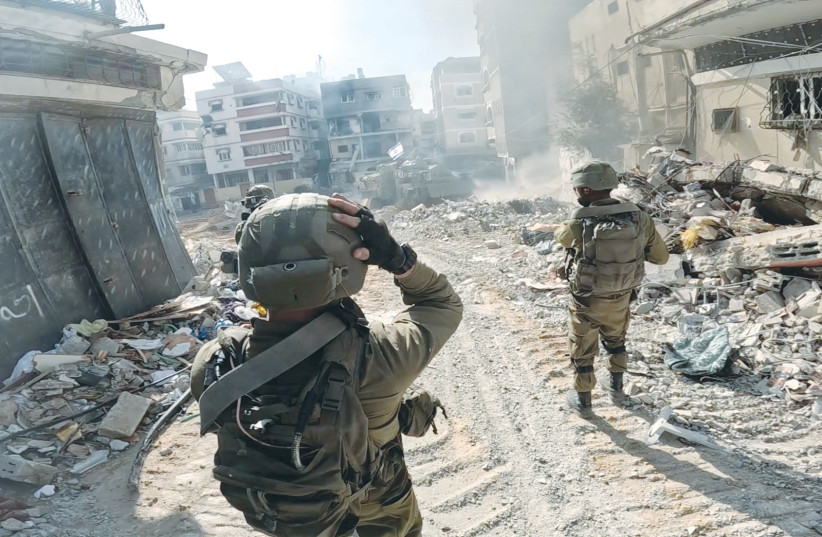Former IDF deputy chief Maj. Gen. and Commanders for Israel’s Security chief) Matan Vilnai on Thursday slammed the government for its own attacks on the IDF during wartime as an act of “treason.”
“This is the first time the IDF chief has faced a ‘front’ in Jerusalem [from the government during a war], and this is unprecedented,” said Vilnai at a press conference where he presented CIS’s new national security strategy for handling Gaza.
Vilnai likely referred to constant attacks on the IDF on a variety of issues by Finance Minister Betzalel Smotrich, National Security Minister Itamar Ben Gvir, and even some more camouflaged attacks related to the October 7 failures by Prime Minister Benjamin Netanyahu.
CIS, which includes around 530 top former defense and intelligence officials, proposed to the government and the public on Thursday that, given that Hamas has not been eliminated completely, Israel will need to learn how to cope with a morphed but still existing Hamas in Gaza.
Former IDF deputy chief Maj. Gen. and CIS chief (the group includes over 500 top former defense and intelligence officials ) Matan Vilnai said that, unfortunately, even as the IDF had taken apart most Hamas battalions, significant pieces of Hamas and its leadership remain, whether in tunnels or faded into the civilian population.
Even according to optimistic IDF estimates, probably 30-40% of Hamas is still operating in Gaza at different levels.
CIS adopted an idea that various Israeli officials and overseas allies have adopted of establishing a new Gazan government of Palestinian technocrats, at the same time that Hamas continues to remain a potential competitor.
In addition, CIS recommends that the IDF start to plan for a gradual withdrawal from Gaza in stages, conditioning each stage based on conditions on the ground.

By establishing a technocratic government and showing a willingness even for partial and gradual withdrawals, CIS said Israel would be able to maintain international legitimacy longer for the IDF remaining in Gaza in whatever fashion might be needed from a security perspective.
CIS did not give a suggested timeline for the gradual staged withdrawal.
To date, Israeli estimates for withdrawing the IDF from Gaza have varied wildly.
In November, Defense Minister Yoav Gallant estimated that between April and September 2024, an expected Hamas insurgency would be put down, and the IDF would be able to transfer aspects of internal security control to a mixed Palestinian-international force.
However, since then, both Gallant and Prime Minister Benjamin Netanyahu have signaled that they expect significant military operations to continue in Gaza throughout all of 2024, with no clear deadline either in 2025.
It is unclear how a potential impending 40-45-day temporary ceasefire deal would impact all these estimates. Still, presuming no ceasefire is permanent, CIS suggested limiting how long the IDF would be committed to large standing forces within Gaza.
At the same time, CIS said that for an indefinite period, the IDF would need to maintain freedom of action to rush into any part of Gaza to confront terror threats, the same way it currently does in the West Bank.
CIS seemed to imply that a model of targeted raids, versus keeping a large, more “in your face” standing army in Gaza, would be viewed as more acceptable by US and EU allies while still achieving the Israeli security goal of preventing the leftover pieces of Hamas from regaining control.
Besides the direct military strategy, CIS suggested that strengthening the Palestinian Authority and engaging with the US and the Saudis to promote regional normalization in a synchronized fashion would weaken Hamas’s ability to compete for power in Gaza long-term.
According to CIS, October 7 ended three failed ideas
According to CIS, October 7 ended three failed ideas: 1) that regional peace could be achieved while ignoring the Palestinians; 2) that Gaza and the West Bank could be managed separately, including permitting Hamas to control Gaza; and 3) that Palestinian national aspirations can be ignored.
Some diplomatic process on the Palestinian front, even if Israel does not agree to all of its allies and the Palestinians’ terms, will strengthen those allies’ support for tough IDF action against Hamas’s remaining forces.
Also, CIS said that the world’s focus on the issue is a real chance to reform the PA.
Further, CIS said that humanitarian aid to Gaza must leap forward.
Recently, CIS was one of the few groups of Israeli defense officials to loudly criticize the government for being “stingy” about humanitarian aid access, even as it affirmed that such humanitarian aid was flowing (whereas anti-Zionists try to deny there is such aid.)
CIS wrote in a letter earlier in March, “The damage caused by the policy of humanitarian stinginess, like that of outrageous statements of irresponsible ministers and MKs, undermines the foundations of security and diplomatic support for Israel emanating from capitals that are most important for our security.”
Regarding the North, CIS expressed lukewarm hope that diplomacy would achieve a new solution, bringing security to Israel’s northern residents facing off against Hezbollah.
But more realistically, CIS said Israel’s home front needed to go into overdrive to prepare for a much worse war from Hezbollah’s 145,000 rocket arsenal.
CIS said the home front is not remotely ready for such a scenario and that the Home Front Ministry must be re-established so that sufficient resources and attention will be poured into the issue.
